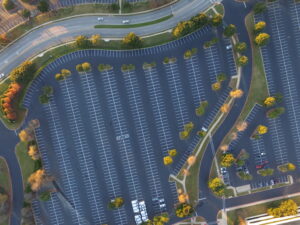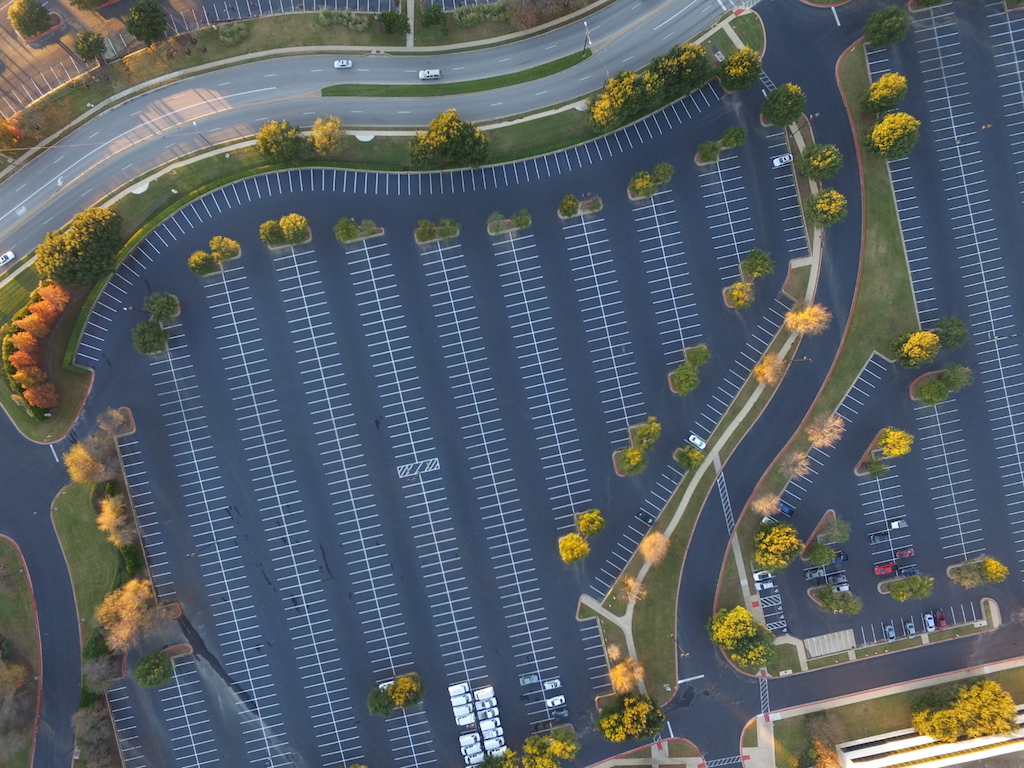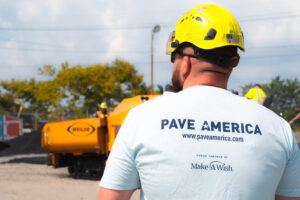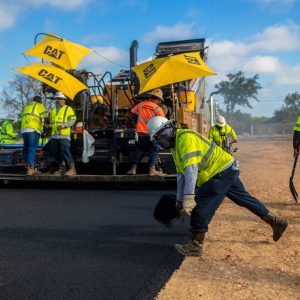 When your paving contractor built your new asphalt pavement, he probably advised you to apply a sealant during the pavement’s first year of life and to repeat the procedure every two years or so. Sealants function as sunscreens to block UV rays, preventing the premature drying of the asphalt binder and helping guard against color loss. Sealcoat also slows the rate at which automotive fluids and other chemicals reach the pavement’s interior structure. Because reputable sealcoat contractors repair cracks and potholes before applying a sealant, many property owners view the fall as the ideal time to schedule a sealant application to winterize their pavements. Other property owners feel that it is best to wait until early spring so that they can bundle the procedure with repairs for any damage that occurred over the winter. Whether they choose the fall or the spring, they are likely to wonder how warm the weather needs to be for a successful sealant application.
When your paving contractor built your new asphalt pavement, he probably advised you to apply a sealant during the pavement’s first year of life and to repeat the procedure every two years or so. Sealants function as sunscreens to block UV rays, preventing the premature drying of the asphalt binder and helping guard against color loss. Sealcoat also slows the rate at which automotive fluids and other chemicals reach the pavement’s interior structure. Because reputable sealcoat contractors repair cracks and potholes before applying a sealant, many property owners view the fall as the ideal time to schedule a sealant application to winterize their pavements. Other property owners feel that it is best to wait until early spring so that they can bundle the procedure with repairs for any damage that occurred over the winter. Whether they choose the fall or the spring, they are likely to wonder how warm the weather needs to be for a successful sealant application.
How Warm Does It Have to be for Sealcoating?
How Do Temperatures Affect Sealants?
The critical thing to remember about seal coat is that contractors apply it as a liquid. At the time of application, the water content of the mix can be up to 70% of the total volume. This water must evaporate if the sealant is to bond with the pavement and form a hard shell. Temperatures have a direct impact on the rate of evaporation. If all other factors are equal, the water in a sealant mix will evaporate twice as fast at 75 degrees Fahrenheit than it will at 55 degrees Fahrenheit. The companies that manufacture seal coat state that the ideal temperature is 70 degrees Fahrenheit, but they also state that it is acceptable to apply their products if the temperature is at least 50 degrees Fahrenheit and rising. However, the temperature should not fall below 50 degrees for at least the first 24 hours following the application. These parameters apply to both the air and ground temperatures.
Even if the ambient and surface temperatures are within acceptable ranges, other factors may make it difficult or impossible for asphalt sealcoating contractors to apply a sealant. The relative humidity can also affect the rate of evaporation. When humidity levels are low, water molecules can escape from the sealant easier than when the humidity is high. Therefore, a high humidity level can be the deciding factor when temperatures are borderline.
Other factors can also influence whether your asphalt contractor is willing to apply a sealant in cool weather. Sunlight is a critical part of the curing process for sealants, so if your pavement lies in dense shade, the longer drying time may make seal coating impossible. Pavements with a northern exposure can also prove problematic. If there is no wind, this can also be a problem; a breeze boosts the rate of evaporation by moving water-saturated air away from the surface of the pavement to allow additional water molecules to escape faster. Lastly, rain, fog, or even dew can ruin a sealant application, so your contractor will need to evaluate the weather carefully.
On the brighter side, experienced sealcoating contractors know how to apply sealants when conditions are not perfect. There are additives that can accelerate curing or compensate for borderline temperatures, and there are specific techniques he can use to meet the challenges of cool-weather applications. However, you should realize that there will be times when no reputable asphalt contractor will attempt to apply a sealant. He will need to consider the weather, but he will also need to consider the scope of the work and the environment surrounding your pavement. Sometimes, the best thing you can do is to ask your contractor to perform any necessary asphalt crack repair or pothole repair, deferring the sealant application until warmer days arrive.
Trust Alpha Paving With the Health of Your Pavement
At Alpha Paving, we know how to help you protect your asphalt pavement and extend its life. We are a full-service Austin paving company with an impeccable reputation. Our services include parking lot and street maintenance, road construction, sealcoating, asphalt overlays and paving, parking lot striping and pavement markings, concrete installation and repair, speed bump installation, asphalt crack repair, and thermoplastic pavement markings. Our customers in Central Texas include various municipalities and counties, airports, subdivisions and HOAs, health care facilities, retailers, apartment complexes, commercial property managers, religious institutions, educational facilities, hotels, entertainment venues, and restaurants. We deliver exceptional work at reasonable rates. To request a free quote, submit the online form, or call 512-677-9001.




